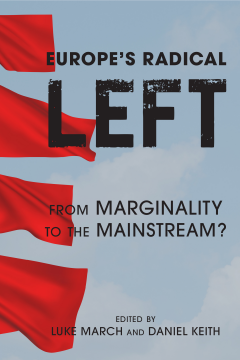
Additional Information
Book Details
Abstract
Although the most pernicious consequences of the crisis have apparently abated, the long-term political repercussions remain unclear. Whereas most attention has focused on the right-wing populist parties, the rejuvenation of the left is an unwritten story of post-crisis politics.
This volume addresses this story, with three principal aims:
- to examine the radical left intellectual response to the crisis, i.e. how actors conceptualise the causes of crisis and its consequences;
- to examine the radical left electoral response to the crisis, i.e. how the crisis has aided or weakened the electoral success of radical left parties and movements;
- to examine organisational responses, i.e. whether the crisis has resulted in new party structures, methods of organising, and internal party tendencies.
Through a combination of comparative and country chapters by some of the foremost scholars of the European radical left, this innovative edited volume provides a very timely analysis of the dog that still barely barks, let alone bites. Europe’s Radical Left is essential reading for anyone trying to understand the effects of the Great Recession on European politics.
Cas Mudde, Associate Professor, University of Georgia
March and Keith's Europe's Radical Left; From Marginality to the Mainstream? provides a comprehensive, eloquent and incredibly well rounded depiction of the party family's response to the severe economic and political crisis that shook the continent in recent years. The volume highlights lesser known but pertinent aspects of radical left politics such as current programmatic dilemmas the party family faces with respect to immigration and Europe and explores its new links to social movements. Dealing with questions such as why the radical left has not benefited electorally from the crisis across the continent to the extent that this might have been expected, on which issues it is plagued by internal divisions and what its future prospects are in Europe's changing party systems renders this volume a must read for scholars of party politics and all those interested in contemporary European politics.
Myrto Tsakatika, Senior Lecturer, University of Glasgow
Luke March is Professor of Post-Soviet and Comparative Politics at the University of Edinburgh. He is author of The Communist Party in Post-Soviet Russia (Manchester University Press, 2002), Radical Left Parties in Europe (Routledge, 2011) and The European Left Party: A Case Study in Transnational Party Building, with Richard Dunphy, (Manchester University Press, 2015).
Daniel Keith is Lecturer in the Department of Politics at the University of York. He wrote his doctoral thesis on the role of organisational factors in shaping the diverse programmatic adaptation of West European Communist parties and their successor parties. He has published articles on the Portuguese Communist Party and the Socialist Party and Green Left in the Netherlands.
Although it is well known that right-wing populist parties have benefited from the crisis in the EU and eurozone little attention has been paid to how the seeming natural beneficiary of this - the contemporary radical left – has responded. March and Keith have admirably filled this scholarly gap by assembling a top notch group of experts who explore among other things the electoral impact of the crisis on various radical left parties, the parties’ varied programmatic responses, and the way in which the crisis has shaped these parties’ internal dynamics and organization. Europe’s Radical Left: From Marginality to Mainstream is the best comparative analysis of the contemporary radical left in Europe to date and sets the bar high for future studies. It is a must read for those studying radical left parties and movements but will be extremely valuable for other scholars of party politics, Europeanists, and those studying political radicalism and extremism.
Jonathan Olsen, Professor of Government, Texas Women’s University, Denton, Texas
Table of Contents
| Section Title | Page | Action | Price |
|---|---|---|---|
| _GoBack | 1 | ||
| _GoBack | 27 | ||
| _GoBack | 113 | ||
| _GoBack | 167 | ||
| h.khicbd2yfkzy | 176 | ||
| h.omdqpo4ivq92 | 177 | ||
| h.gidu4alhc9mf | 177 | ||
| h.930bh8769u6j | 177 | ||
| h.4pa916haknmz | 177 | ||
| h.4o0m71qn80t8 | 178 | ||
| h.uk2eg7glacvw | 178 | ||
| h.12xr4ethw6w | 178 | ||
| h.xbagu9eaoq81 | 178 | ||
| h.qqmoown0e59g | 179 | ||
| h.2spucpg0r3or | 179 | ||
| h.d8z4ularqke6 | 179 | ||
| h.m51soadvnqx | 179 | ||
| h.u169yk5qob4u | 180 | ||
| h.dazvtgi4urol | 181 | ||
| h.hncsvoy4615h | 181 | ||
| h.sqswe7wz9sti | 181 | ||
| h.dw4wiewblpal | 181 | ||
| h.32i45f4nmqdy | 182 | ||
| h.b1i6i2v0oe2b | 182 | ||
| h.ke2noyqi3w5n | 183 | ||
| h.o9154ee0jgud | 183 | ||
| h.4q32r1zh8o09 | 183 | ||
| h.gjdgxs | 183 | ||
| h.rg11whd1yxax | 183 | ||
| _GoBack | 273 | ||
| _GoBack | 378 | ||
| _GoBack | 383 | ||
| _GoBack | 423 | ||
| _GoBack | 441 |
